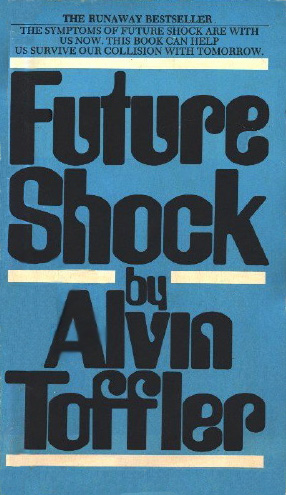 |
What's going on?? This class is nothing like what I'm used to. Blogging? Google+? No set number of pages to read? No universal textbook? What in the world will I be graded on? What is this class?? WHAT AM I SUPPOSED TO DO???
First of all, CALM DOWN. DON'T FREAK OUT. You are going to be okay--promise.
You are experiencing, in a way, a little thing called Future Shock.
Future shock, according to Toffler, is "culture shock within our own culture." Our culture, because of the breakneck speed of technological advances, is changing so rapidly that we can't adapt to the constant winds (or more accurately, hurricane-force gales) of change and novelty. Toffler writes,
"Future shock is the dizzying disorientation brought on by the premature arrival of the future. It may well be the most important disease of tomorrow."
Welcome to tomorrow, people. This class, for people like me, is a more personal and in-your-face version of future shock. When I first began this class, I felt my learning curve was a vertical line, and trying to get a grasp on everything I was supposed to do was like drinking from a fire hose. The constant novelty nearly blew my brain circuits. Several times. I was experiencing future shock, and some of you may be feeling that too.
That's all well and good, you may say, but I still don't know what to do.
Okay, I'll pause and outline some logistics to help get the ball rolling. So on this blog, if you haven't already done so, click on the Syllabus tab at the top of the page and then click the "Getting Started" button on the top left.
Go through the steps; get a Google account, join Google+, set up your new blog on Blogger (follow instructions carefully!), do your introductory post, and join Goodreads.
Done that? Good. So now what?
 |
| Time to think. |
Well, now you have a chance to do a little bit of self-directed learning. Our topic for class on Tuesday will be the Renaissance. So what do you know about the Renaissance? What was that all about? What sites can you find that help you understand the different aspects? What was the art like? What were the primary ideologies? These are just a few of the thousands of questions you can ask yourself to use as a starting point for your self-directed learning. Try to get a general idea and then perhaps focus in on an aspect that interests you. Share links to some sites on Google+. Perhaps narrate your thoughts on the Google+ stream and on your blog. Think about how your digital concept relates to ideas and issues that people were dealing with back then. (This last one is key--be sure to keep that in mind as you go along.)
Well, thanks for nothing, I can hear some of you saying, because I still don't know where to start!
Yes, I know that suddenly being handed all this freedom can be a little intimidating at first. If you don't know exactly what you're doing, how do you know if you're doing it right?
Well, stop worrying. Pick a topic to Google and start there. Keep learning and exploring and posting and sharing. Don't be afraid to talk about something even if you don't know everything there is to know about it. Own your ignorance. Like we said in class, we don't expect your blog posts or comments or whatever to be perfect/stellar right away. (Actually, if you look at some of my early posts, you will see that they are not the greatest.) One of our main principles we are trying to help you realize in this class is that the process has power. Knowledge in process is just as valuable (and sometimes even more valuable) than a finished product like a paper or a project. This class is less about the grade and more about developing a mindset: a mindset that involves digital literacy, computational thinking, consuming, creating, and connecting. And don't worry--we're still learning too, and we'll help guide you along the way.
 |
| Adaptation--Darwin's finches |
Consider these first few weeks a crash course in how to deal with Future Shock. This Digital Civilization class is, in a very real way, a survival course. Think back to Bio 100 (or biology back in high school) and recall that in order to survive and thrive, a species must be aware of and adapted to its environment. Well, the environment that we're living in now is saturated with technology and constantly requires us to change and adapt to the constant novelty popping up all around us. As Alvin Toffler writes,
Do you know how to survive and THRIVE? Are you willing to do what it takes to learn? I invite you to stick with this class and make it one of the most influential and transformative learning experiences you've ever had.
"This is the prospect that man now faces. Change is avalanching upon our heads and most people are grotesquely unprepared to cope with it."
Do you know how to survive and THRIVE? Are you willing to do what it takes to learn? I invite you to stick with this class and make it one of the most influential and transformative learning experiences you've ever had.
For a video documentary outlining Future Shock, click here.
Photo credits: LastRenshai, mharrsch and, Jared Zimmerman on Flickr
Photo credits: LastRenshai, mharrsch and, Jared Zimmerman on Flickr
